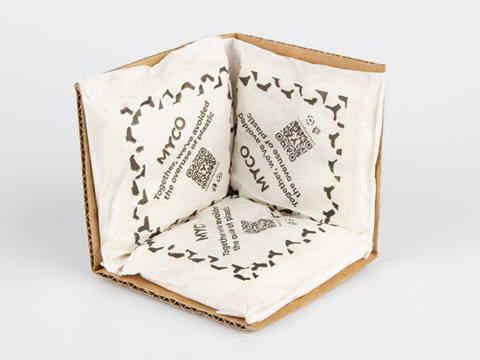
Czech company Myco has unveiled its ‘100% plastic free’ biodegradable alternative to polystyrene packaging, made from mushroom mycelium and organic waste.
Apparently, the material is a composite consisting of mycelium, a network of fungal fibres, and organic waste such as sawdust, hemp shavings, and paper. The mycelium grows through the loose material and fortifies it.
Myco says its production technology enables the company to produce the material at scale, enabling it to compete with established polystyrene packaging in both properties and price. The technology includes a continuous line for preparing and drying the material and a ‘streamlined’ product moulding process.
According to Myco CEO David Šohaj Minařík, the material degrades naturally in the environment, ‘creating zero microplastics and leaving a small carbon footprint’. He adds that the material’s characteristics such as firmness and flexibility allow it to fully replace foam polystyrene in packaging.
Myco produces shaped fixation moulds for product shipping (Myco FixPack) and comprehensive packaging systems combining mycelium with cardboard (Myco 4Pack and SafePads). The company is currently developing Odour Concentrate Carriers and Aroma Diffusers. Myco states it is in talks with foreign partners and working on an expansion onto the German market.
In related news, researchers at the University of Washington recently mixed coffee grounds, mushroom spores, and mycelium to 3D-print a ‘compostable’ packaging material said to perform similarly to polystyrene dunnage. When inoculated with the mushroom spores that form the mycelial skin, the coffee grounds can apparently be formed into a material set to replace plastics, even in complex shapes.
PAPACKS and Ukrainian Hemp collaborated last month to create a scalable supply chain for certified industrial hemp, aiming to provide a renewable, recyclable alternative to wood-based pulp and plastic. PAPACKS claims that industrial hemp enables the production of moulded fibre packaging and paper-based materials without high energy input or excessive CO2 emissions.
If you liked this story, you might also enjoy:
The ultimate guide to the Packaging and Packaging Waste Regulation in 2025
How are the top brands progressing on packaging sustainability?
Everything you need to know about global packaging sustainability regulation in 2025
The key to increasing the use of reusable packaging in supermarkets














No comments yet